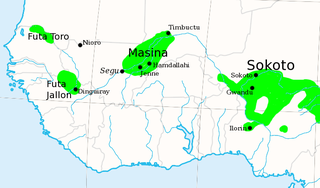Shehu Usman ɗan Fodio was a Fulani scholar, Islamic religious teacher, revolutionary and a philosopher who founded the Sokoto Caliphate and ruled as its first caliph. After the successful revolution, the "Jama'a" gave him the title Amir al-Mu'minin. He rejected the throne and continued calling to Islam.
Hausa–Fulani are people of mixed Hausa and Fulani origin. They are primarily found in the Northern region of Nigeria, most of whom speak a variant of Hausa or Fula or both as their first language.

The Jihad of Usman dan Fodio was a religio-military conflict in present-day Nigeria and Cameroon. The war began when Usman dan Fodio, a prominent Islamic scholar and teacher, was exiled from Gobir by King Yunfa, one of his former students.

The Sokoto Caliphate, also known as the Sultanate of Sokoto, was a Sunni Muslim caliphate in West Africa. It was founded by Usman dan Fodio in 1804 during the Fulani jihads after defeating the Hausa Kingdoms in the Fulani War. The boundaries of the caliphate are part of present-day Cameroon, Burkina Faso, Niger, and Nigeria. By 1837, the Sokoto state had a population of around 10-20 plus million people, becoming the most populous empire in West Africa. It was dissolved when the British, French and Germans conquered the area in 1903 and annexed it into the newly established Northern Nigeria Protectorate, Senegambia and Niger and Kamerun respectively.
Muhammadu Bello was the second Sultan of Sokoto and reigned from 1817 until 1837. He was also an active writer of history, poetry, and Islamic studies. He was the son and primary aide to Usman dan Fodio, the founder of the Sokoto Caliphate and the first Sultan. During his reign, he encouraged the spread of Islam throughout the region, increasing education for both men and women, and the establishment of Islamic courts. He died on October 25, 1837, and was succeeded by his brother Abu Bakr Atiku and then his son, Aliyu Babba.
Yunfa was a king of Gobir, a city-state in Hausaland in what is now Nigeria. He was the son of a Sultan of Gobir Nafata. He is particularly remembered for his conflict with Islamic reformer Shaikh Usman dan Fodio.
The Battle of Tsuntua, fought in December 1804, was one of the largest battles of the Fulani War.

Gobir was a city-state in what is now Nigeria. Founded by the Hausa in the 11th century, Gobir was one of the seven original kingdoms of Hausaland, and continued under Hausa rule for nearly 700 years. Its capital was the city of Alkalawa. In the early 19th century elements of the ruling dynasty fled north to what is today Niger from which a rival dynasty developed ruling as Sarkin Gobir at Tibiri. In 1975 a reunited traditional sultanate took up residence in Sabon Birni, Nigeria.
Mallam Abdullahi ɗan Fodio, a prominent Islamic scholar, jurist, poet and theologian, was the first Amir of Gwandu and first Grand Vizier of Sokoto. His brother, Usman dan Fodio (1754–1817) was the founder of the Sokoto Caliphate. Usman, being more of a scholar than politician, delegated the practical regency of the western part of his empire to Abdullahi and the eastern part to his son Muhammed Bello, who later became the Sultan of Sokoto after his father.
Abu Bakr Atiku was the third Sultan of the Sokoto Caliphate, reigning from October 1837 until November 1842.
Sarki Nafata of Gobir, one of a series of rulers of the small Hausa state of Gobir, today in northern Nigeria is best remembered for his opposition to Fulani Islamic reformer Usman dan Fodio, who later led a popular uprising against the Gobir rulers, and established the Sokoto Caliphate.

The Fulajihads sometimes called the Fulani revolution were a series of jihads that occurred across West Africa during the 18th and 19th centuries, led largely by the Muslim Fula people. The jihads and the jihad states came to an end with European colonization.
Nana Asmaʾu was a Fula princess, poet, teacher, and a daughter of the founder of the Sokoto Caliphate, Usman dan Fodio. She remains a revered figure in northern Nigeria. She is held up by some as an example of education and independence of women possible under Islam, and by others as a precursor to modern feminism in Africa.
The Jobawa are a sub clan of the Fulani ethnic group. Primarily found in the old Eastern Kano, they were the first Fulani clan to make contact with the Hausa people.

The Battle of Gawakuke was an engagement fought between the Sokoto Caliphate and the Gobir city-state at Gawakuke in northern Nigeria on 9 March 1836. The battle was a victory for Sokoto, and secured the Gobir kingdom's subordination to the caliphate.

Hausa literature is any work written in the Hausa language. It includes poetry, prose, songwriting, music, and drama. Hausa literature includes folk literature, much of which has been transcribed, and provides a means of recording, preserving, and transmitting knowledge, especially in regard to social, psychological, spiritual, or political roles.
Ali Jedo, was the first Amir al-jaish al-Islam of the Sokoto Caliphate. Prior to the jihad, he was the leader of the Fulbe of Konni in modern-day Sokoto State.
Abd al-Qadir dan Tafa, also known as Dan Tafa, was a historian, theologian, philosopher, poet and jurist from the Sokoto caliphate. He was considered the "most learned" scholar of his time. He was a prolific scholar who delved into various fields of knowledge, but he was particularly renowned for his historical and philosophical writings.
The Revolt of Abd al-Salam was a rebellion against the Sokoto Caliphate, driven by perceived bias against the Hausawa. The revolt was led by Mallam Abd al-Salam, a highly respected Hausa scholar. Abd al-Salam was among the leaders of the Sokoto Revolution that led to the establishment of the caliphate. However, as time went on, he grew disillusioned with the rewards he received compared to other leaders, many of whom were of Fulbe ethnicity.





